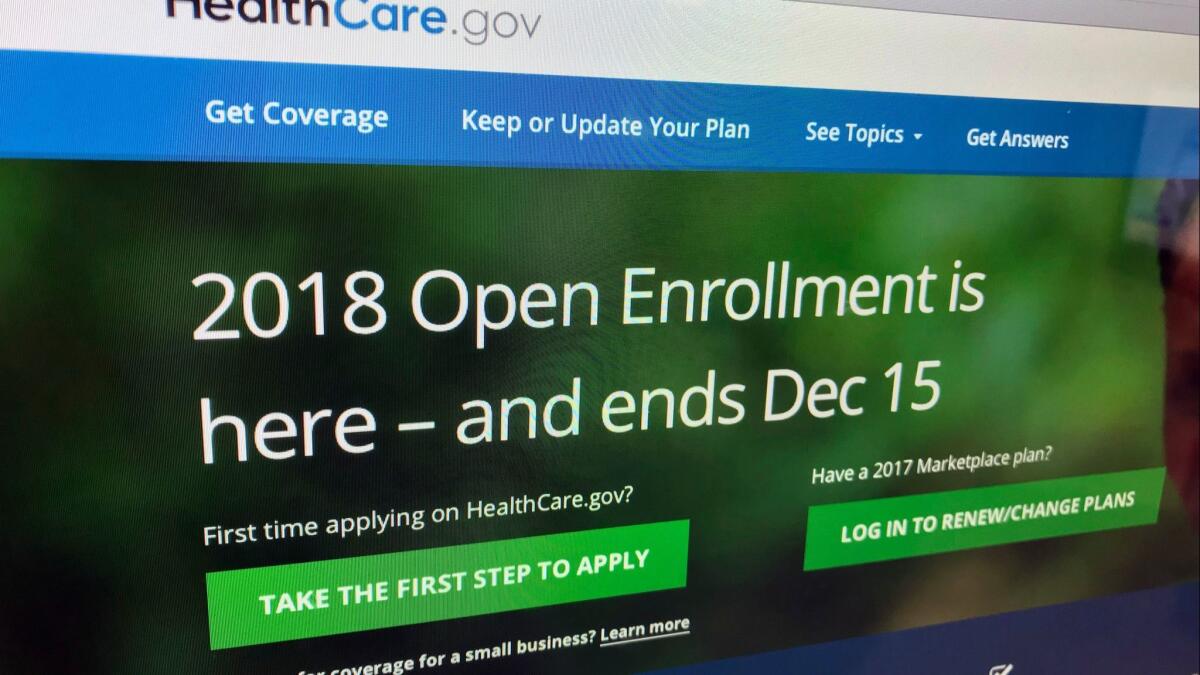Editorial: California should fight the good fight against bad health insurance policies

This one should be a no-brainer: California lawmakers are considering a bill that would ban so-called junk health insurance policies — short-term plans that do not comply with the consumer protections set out in Obamacare. These cheap plans typically offer no protection against the risk of bankrupting medical bills; instead, they cover just a limited number of doctor visits and days in the hospital, with glaring gaps in coverage, huge out-of-pocket costs and comparatively low caps on total benefits.
Yet this is precisely the sort of policy that the Trump administration and some congressional Republicans have been promoting as a way to lower health insurance premiums. That’s all the more reason for the Legislature to approve the bill imposing a ban, SB 910 by Sen. Ed Hernandez (D-Azusa).
The debate over junk insurance plans epitomizes the years-long fight between Republicans and Democrats over Obamacare.
The insurance reforms in that law — also known as the Affordable Care Act — were designed to help the roughly 20 million Americans who buy insurance independently, rather than getting coverage through a large employer or a government program such as Medicare. Among other things, these reforms ban insurers from discriminating against applicants with preexisting conditions, require policies to cover a comprehensive set of ailments and conditions, and provide subsidies to people with low to moderate incomes.
Obamacare allowed insurers to continue to offer short-term health policies that did not comply with the reforms, but an Obama administration regulation limited those policies to three months or less. The idea was to make sure the policies were truly stopgap measures for people who failed to sign up for comprehensive coverage during the annual open enrollment periods, not alternatives to those more robust plans.
The debate over junk insurance plans epitomizes the years-long fight between Republicans and Democrats over Obamacare.
By requiring all adults to carry comprehensive policies and guaranteeing coverage at the same price for the sick and the well, however, the law drove up premiums — especially for younger, healthier Americans. Republicans have sought to lower premiums, not by attacking the rising cost of medical treatments and prescription drugs, but by giving consumers the option to buy less coverage for less money. Starting next year, the options will include buying no coverage at all.
What all of these steps would do, however, is separate healthier people who feel they don’t need comprehensive-but-expensive coverage from those who are older, sicker or don’t want to run the risk of huge medical bills they can’t pay. That defeats one of the key goals of Obamacare, which is to extend coverage to more people while spreading costs and risks more broadly across the population.
The Trump administration makes no bones about this. In February, it unveiled a proposal to let Americans sign up for short-term plans that last as long as 364 days — in effect, an entire year. Insurers offering those plans would be free to gouge (or reject) applicants with preexisting conditions and then deny coverage for those ailments. Such plans also frequently include no coverage for maternity care, substance abuse treatment and name-brand drugs, among other costly therapies and procedures. In other words, companies can design their plans to appeal only to people who think they won’t get sick or injured.
Analysts say that Trump’s proposal, like other steps the administration has taken, would leave fewer healthy people buying policies through the state Obamacare exchanges. Combine that with the end of the mandate to buy insurance and the result would be an average premium increase of 18%, the Urban Institute estimated. In other words, opening the door wider to cheap junk plans would lead to sharp increases in the premiums paid by millions of Americans. And because the vast majority of the people buying insurance on the Obamacare exchanges are subsidized, much of the cost increase would be borne by federal taxpayers.
That’s a policy worth resisting. Cheap junk plans are often just that — cheap junk. To protect Californians from being lured away from costlier plans that provide real protection, lawmakers should pass SB 910.
In another blow to Obamacare’s efforts to expand insurance coverage, the Trump administration has also invited states to impose work requirements on low-income and disabled individuals receiving Medicaid. It’s a solution in search of a problem — most Medicaid recipients who are capable of working already do, so the main effects of the change would be to raise costs and drive eligible people off the rolls. And the less access that people with health problems have to treatment, the more likely they’ll be unable to work. Talk about self-defeating.
That’s why Hernandez has offered another bill, SB 1108, that would bar the state from going down that road. It’seems like a symbolic gesture — it’s hard to imagine this state adding work requirements to Medi-Cal. Nevertheless, lawmakers should pass it to show that they recognize a counterproductive federal initiative when they see one.
Follow the Opinion section on Twitter @latimesopinionand Facebook
More to Read
A cure for the common opinion
Get thought-provoking perspectives with our weekly newsletter.
You may occasionally receive promotional content from the Los Angeles Times.










